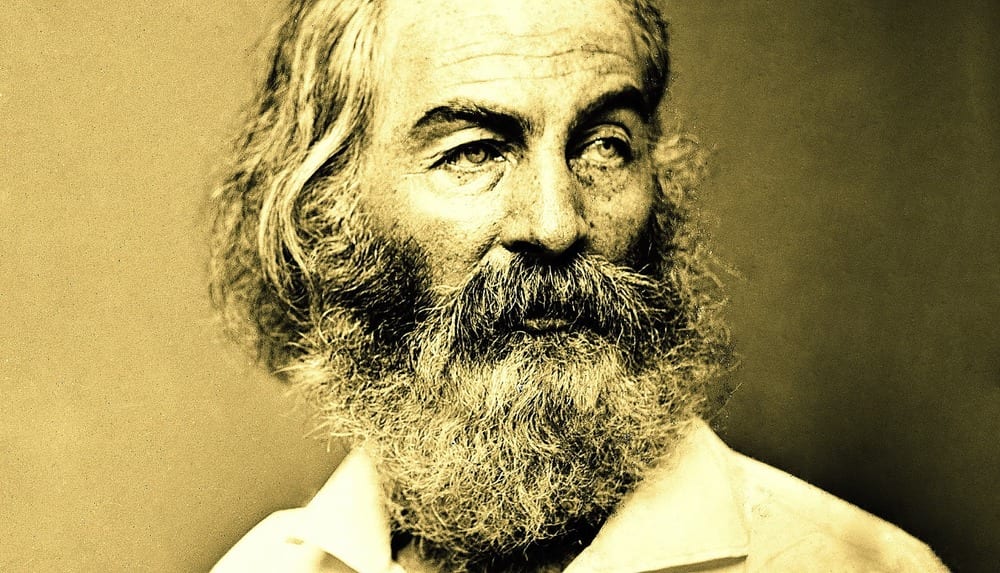Walt Whitman (1819 – 1892)
Walt Whitman was a poet, essayist, and journalist who transformed poetry around the world with his disregard for traditional rhyme and meter and his celebration of democracy and sensual pleasure. His masterpiece, Leaves of Grass, a collection of poems, is widely studied by poets, students and academics, set to music, translated into numerous languages, and is widely quoted.
His influence can be found everywhere – in contemporary best seller lists to feature films and musical works, both “serious” and popular. Whitman has left an indelible mark on American culture. His influence is evident in the work of contemporaries as well as poets who wrote in the decades after his death, but it goes beyond that: his style and his vision of America were very influential in later literary movements as well, including the poets of the Beat Generation of the 1950s and 60s who gained notoriety for their counter-cultural lifestyles and controversial publications – Jack Kerouac, William Burroughs, and Allen Ginsberg being the best known Beats. His influence can be seen especially in Ginsberg’s poetry with Ginsberg’s use of free verse and in the structure of several of his longer poems, including Howl, which mimics Whitman’s original use of the technique.
Whitman began writing what would become Leaves of Grass in 1850, and he continued writing, editing and revising it until his death. The poems break the boundaries of poetic form and are generally prosaic. He is often referred to as the father of free verse. He also used unusual images and symbols in his poetry, including rotting leaves, tufts of straw, and debris. He wrote openly about death and sexuality, including prostitution. From universities to Hollywood, Whitman’s legacy lives on in American culture. He engaged in vast themes in Leaves of Grass – themes that have captivated artists, religious leaders, and scholars. His genius for form and function allows his work to remain meaningful and vital even generations after his death. There is no doubt that Whitman’s will live on in American culture for generations to come.
The poems have been set to music by a large number of composers – more than any other American poet. Those who have set them to music have included John Adams, Ernst Bacon, Leonard Bernstein, Benjamin Britten, Rhoda Coghill, Ronald Corp, George Crumb, Frederick Delius, Howard Hanson, Karl Amadeus Hartmann, Hans Werner Henze, Paul Hindemith, Ned Rorem, Ralph Vaughan Williams, Kurt Weill, and Roger Sessions. In 2014 composer John Zorn released On Leaves of Grass, an album inspired by and dedicated to Whitman, whilst Crossing – an opera composed by Matthew Aucoin – inspired by Whitman’s Civil War diaries, premiered in 2015.
Walt Whitman has also been recognised since his death with a number of awards: On May 16, 1957 the Walt Whitman Bridge, which crosses the Delaware River near his home in Camden, was opened. In 2009 Whitman was inducted into the New Jersey Hall of Fame. In 2013 Whitman was inducted into the Legacy Walk, an outdoor public display that celebrates LGBT history and people.
Read biographies of the top 20 American authors >>
Read biographies of the top 10 English writers >>
Read biographies of the 30 greatest writers ever >>





Very accurate, celebratory overview of Whitman. Just an addendum—I don’t ordinarily emphasize the importance of any artist’s sexuality or love life, since artists generally neither examine nor judge anyone else’s. But Whitman is different, in that historians generally agree that he was primarily attracted to men, and though he declined to discuss that, it clearly gives his poetry an energy of exuberant defiance not indulged by his peers. His fearless truth of intelligence gave America, the Puritanical Republic, permission to think physically and feel corporeally, to enjoin Logos with Eros. Consequently Whitman has been an important model for gay men, for gay artists and for all pioneers of the horizons of language for 170 years. His stature—like Michelangelo, Humboldt, Tchaikovsky, Cavafy, Britten, Proust, Wilde and Lorca—as a great innovator and creative renegade—has since vindicated marginalized communities, whose stories often wither unheard under the din of the dominant narrative in literate societies, or lie buried under disregard by the dominant paradigm of every chapter in history. Importantly, Whitman was also an abolitionist, and a nurse who expressed profound compassion for the Union’s wounded men, as he offered them whatever treatment there was in the 1860s, for the most gruesome wounds war can make, on battle fields that America has never witnessed since.